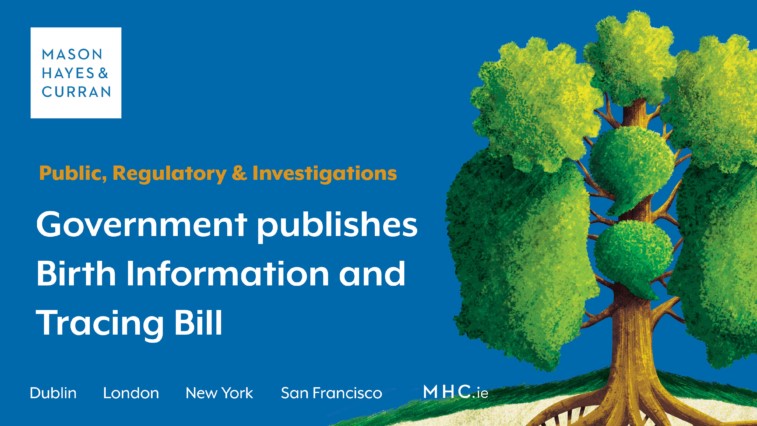Government publishes Birth Information and Tracing Bill

The Birth Information and Tracing Bill 2022 is a significant piece of legislation which gives adopted and other categories of people an automatic right to certain information and documentation. It also establishes a statutory Contact Preference Register and provides for the establishment of a tracing service. This allows people to register their preference regarding contact with family. We examine the scope and other notable provisions of the Bill.
Who does the Bill apply to?
The Bill applies to “relevant persons” which are defined as:
- An adopted person
- A person who is or has been the subject of an incorrect birth registration, or who has reasonable grounds for suspecting so
- A person who has been resident in a Mother and Baby Home or County Home at any time between their birth and their 18th birthday, or who has reasonable grounds for suspecting so, or who was the subject of a nursed or boarded out arrangement
What information are relevant persons entitled to?
Access to a range of “birth information” and “early life information” is provided for under the Bill, in addition to one’s birth certificate. “Birth information” includes details of the date, place and time of a person’s birth, their sex and their forename and surname. In relation to their birth parents, it includes the forename, surname, birth surname, address, occupation, date of birth, civil status and, where applicable, former surname of a person’s parents. It also includes the birth surname of a person’s maternal and paternal grandmother.
“Early life information” is broadly defined, including, but not limited to:
- The place where the person resided and the dates of that residence
- Where applicable, information relating to his or her baptism or any other ceremony of a religious or spiritual nature
- Information on any medical treatments, procedures or vaccinations administered
- Information on whether a parent or genetic relative of the person visited or enquired as to the person. This information does not include the name of that person, but will state the degree of relationship
Relevant bodies, including the Adoption Authority of Ireland and Tusla, “shall”, to the extent that it is practicable to do so, provide this information to a relevant person aged 18 years or over who applies in writing for the provision of that information to them.
Tracing service
The Bill provides for Tusla and the Adoption Authority to provide a tracing service to enable people to trace family members for consensual contact and/or sharing of information. The service will assist and support reunion between people if they so wish. Relevant persons, the parents of relevant persons, and other relatives, including adoptive parents, grandparents, siblings, aunts, uncles and first cousins, will be able to apply for a tracing service.
Contact Preference Register
The Adoption Authority is to establish a “Contact Preference Register”, the purpose of which is to enable certain persons to register their preference regarding future contact with a family member. A wider range of people will be able to apply to the Register than to the tracing service. The Register will allow flexibility in terms of the contact preferences they can indicate. They may specify whether:
- They are seeking to have contact with a specified person
- They are willing to be contacted by a specified person
- They are unwilling to be so contacted
- They are seeking information regarding a specified person
- They are not willing to have contact with a specified person but are willing to provide information to that person if they request it
Conclusion
This is long-awaited legislation which has been brought about in response to the recommendations of the Final Report of the Commission of Investigation into Mother and Baby Homes. Organisations that hold birth and early life information will welcome the publication of the legislation as it brings clarity to how they can manage and disclose such information which is under their care.
For more information, please contact a member of our Public, Regulatory & Investigations team.
The content of this article is provided for information purposes only and does not constitute legal or other advice.
Share this:



